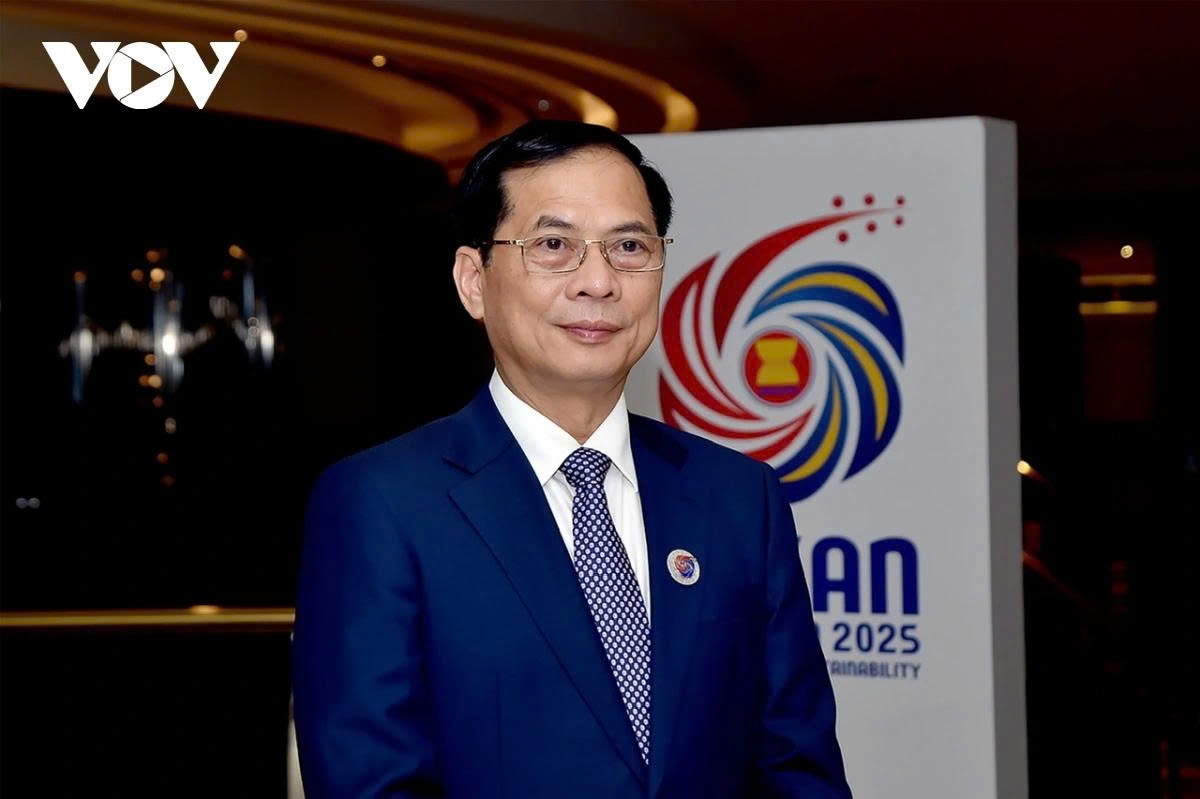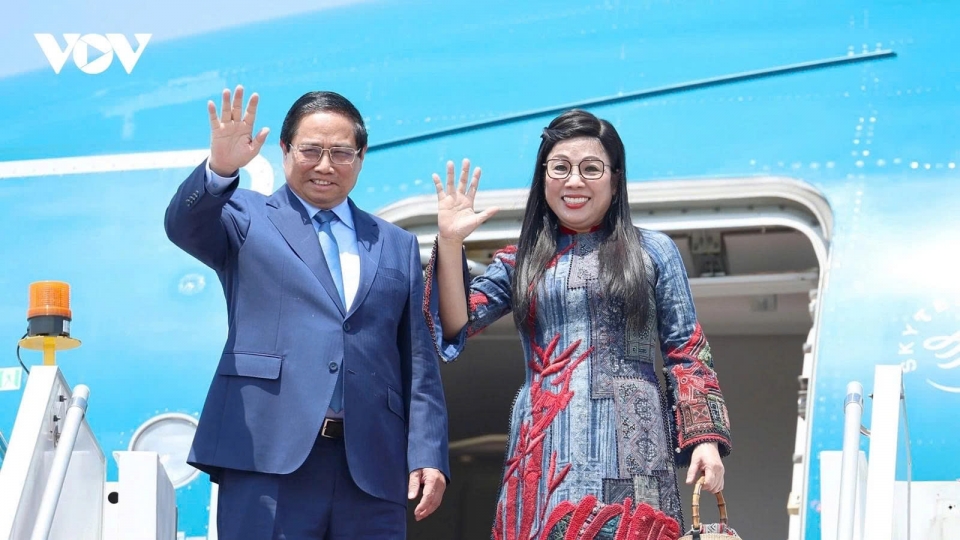PM’s working trip to Malaysia reaps substantive achievements, says diplomat
VOV.VN - Vietnamese Prime Minister Pham Minh Chinh’s official visit to Malaysia and his participation in the 46th ASEAN Summit and related meetings concluded successfully, yielding significant and practical outcomes, according to Deputy Prime Minister and Minister of Foreign Affairs Bui Thanh Son.
Ample room for Vietnam – Malaysia cooperation

Son, who accompanied the PM, told the press on May 28 the visit reflected Vietnam’s commitment to implementing the foreign policy direction set by the 13th National Party Congress, that emphasises the country’s desires to deepen relations with neighbouring and strategic partners, including Malaysia.
During the visit, Chinh held in-depth and effective talks with senior Malaysian leaders. Both sides agreed to establish an annual exchange mechanism between the two Prime Ministers to promptly address obstacles and elevate bilateral cooperation under the new Comprehensive Strategic Partnership framework. They also announced the completion of an action plan for the 2025–2030 period, expected to be signed later this year.
The two leaders shared common ground on various regional and international issues, particularly reaffirming ASEAN’s consistent stance on the East Sea issue.
Both sides agreed on key directions to further enhance economic connectivity, aiming to raise bilateral trade to US$20 billion by 2030, while working toward a more balanced trade relationship. They also committed to minimising trade barriers, facilitating the exchange of key export-import items, and expanding cooperation into the digital economy, circular economy, green economy, just energy transition, science and technology, and innovation.
On defence and security cooperation, the two sides consented to strengthen collaboration, accelerate the signing of relevant agreements, and jointly tackle transnational crime, cybercrime, terrorism, and reactionary organisations. They also discussed the possibility of establishing a maritime consultation mechanism and a hotline to combat illegal, unreported, and unregulated (IUU) fishing.
Notably, during the visit, government agencies and major enterprises from both countries reached three breakthrough agreements in energy cooperation and education and training.
During the ASEAN Summit, Chinh joined his Malaysian and Singaporean counterparts to witness the signing of an appendix to a cooperation agreement for exporting offshore wind power from Vietnam to Singapore. This tripartite agreement between PTSC (Vietnam), MYEC (Malaysia), and Sembcorp (Singapore) marks a key milestone in energy cooperation and aligns with the renewable energy transition policies of the involved parties. It also opens up prospects for developing a common ASEAN power grid.
It’s safe to say that PM Pham Minh Chinh’s official visit to Malaysia was a major success, creating strong momentum to elevate Vietnam - Malaysia relations to a new phase of deeper, and more practical and comprehensive development, said Son.
Key highlights of ASEAN Summit and Vietnam’s contributions
Foreign Minister Son affirmed that the recently concluded 46th ASEAN Summit and related meetings in Kuala Lumpur, Malaysia, have achieved significant milestones, showcasing ASEAN’s leadership role in shaping the future of the region amid global and regional uncertainties.
The first major milestone, he said, was the signing of the Kuala Lumpur Declaration on “ASEAN 2045: Our Shared Future” by ASEAN leaders. The leaders also adopted the ASEAN Community Vision 2045, built upon four strategic pillars of political-security, economic, socio-cultural, and connectivity. This vision reflects ASEAN’s aspiration for peace, stability, and shared prosperity in the decades to come.
The second historic milestone, according to the diplomat, was the consensus to admit Timor-Leste as ASEAN’s 11th member this October. This marks the first expansion of the grouping in over three decades, symbolising ASEAN’s spirit of inclusivity and cohesion. It also represents a major step for Timor-Leste and opens up new space for regional cooperation and development.
The third notable highlight was ASEAN’s proactive strategy to broaden cooperation in response to shifting geopolitical and geo-economic landscapes. Through summits between ASEAN and the Gulf Cooperation Council (GCC) and between ASEAN, GCC and China, ASEAN aims to diversify partnerships, markets, and supply chains, strengthening inter-regional collaboration moving forward.
Under the leadership of PM Pham Minh Chinh, the Vietnamese delegation made practical and forward-looking contributions to the Summit. The Prime Minister introduced the message of "5 enhancements" for ASEAN, namely greater solidarity, greater resilience, greater proactiveness, greater inclusiveness, and greater sustainability, aiming to bolster the bloc’s collective strength and ensure inclusive development for both present and future generations.
Given the complex and unpredictable global landscape, the PM underscored the importance of maintaining ASEAN’s strategic autonomy, enhancing its centrality, and promoting innovation, green growth, digital transformation, and sustainable development as key pillars of cooperation. This includes mobiliding resources from both public and private sectors across the region.
He proposed several initiatives, including accelerating negotiations for an ASEAN-GCC Free Trade Agreement (FTA); exploring the feasibility of an ASEAN-GCC-China FTA; focusing on high-potential, breakthrough areas like renewable energy, smart agriculture, sustainable infrastructure, green technology, tourism, and aviation; and establishing a robust financial connectivity network among major regional financial hubs to drive inter-regional cooperation.
Enhanced cooperation opportunities with partner countries
While attending the 46th ASEAN Summit, as well as the ASEAN-GCC Summit and the ASEAN-China Summit in Kuala Lumpur, Prime Minister Pham Minh Chinh held bilateral meetings with leaders of neighbouring countries, strategic partners, and other key partners.
During these meetings, leaders of partner countries reaffirmed the importance of Vietnam’s role and stature on the international stage. They praised the country’s policies in promoting harmonious and sustainable development, as well as its strategic breakthroughs in institutional reform, science and technology, infrastructure, and human resources, seeing these as valuable opportunities for cooperation and reference amid global challenges.
With the Chinese Premier, the two sides highly valued the historic significance of General Secretary and President Xi Jinping’s recent visit to Vietnam. They agreed to effectively implement the common understandings reached by the top leaders of both Parties and countries. Both sides committed to increasing high-level strategic exchanges; enhancing political trust; and advancing practical cooperation with tangible progress, especially in high-quality trade and investment, railway connectivity, and the goal of launching the Lao Cai–Hanoi–Hai Phong railway project in 2025.
They also vowed to collaborate closely with ASEAN to maintain regional peace and stability, and accelerate negotiations for a substantive and effective Code of Conduct (COC) in the East Sea, in line with international law and the 1982 United Nations Convention on the Law of the Sea (UNCLOS).
In meetings with the Prime Ministers of Laos and Cambodia, the leaders of the three countries agreed on key directions to implement the outcomes of the trilateral Party leaders’ summit held in February 2025. They committed to transforming trilateral cooperation substantively, especially by enhancing connectivity in five priority areas of transport infrastructure, energy, trade, digital transformation, and human resources.
Prime Minister Pham Minh Chinh and ASEAN leaders also held in-depth discussions on ways to strengthen ties in economics, trade, investment, defence-security, culture-education, and tourism, while highlighting the need to expand cooperation into emerging and high-potential areas such as infrastructure connectivity, green transition, circular economy, semiconductors, and artificial intelligence (AI).
With the Gulf Cooperation Council, both sides expressed interest in expanding the network of partnerships and promptly initiating negotiations for a Vietnam-GCC Free Trade Agreement (FTA). They also discussed ways to facilitate greater cooperation in energy, infrastructure, digital transformation, and Halal products and services.





